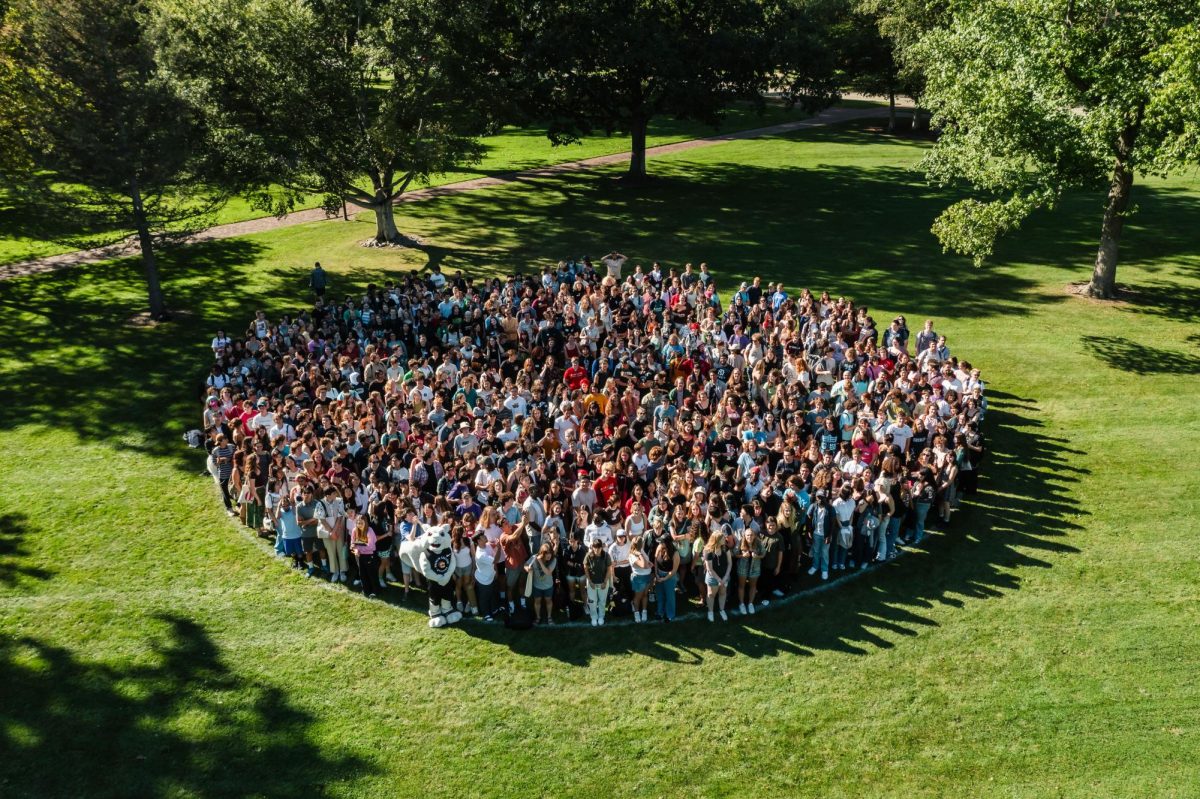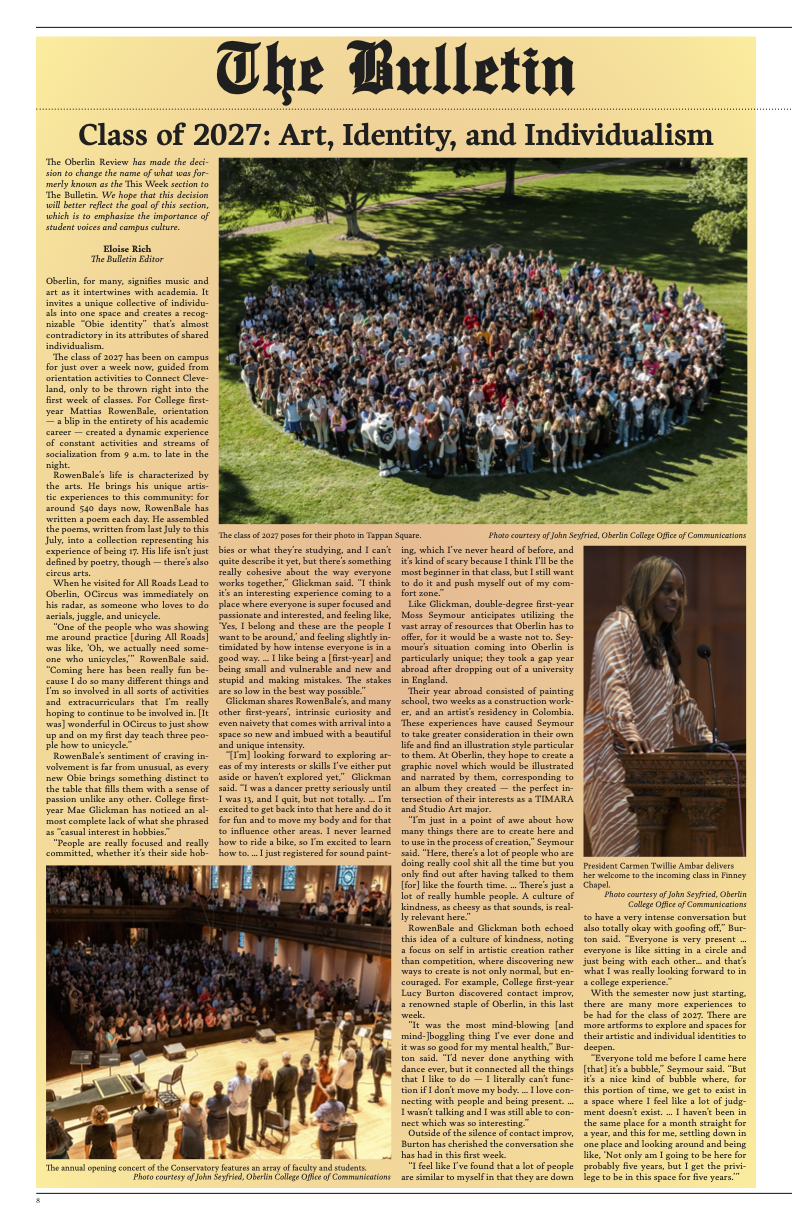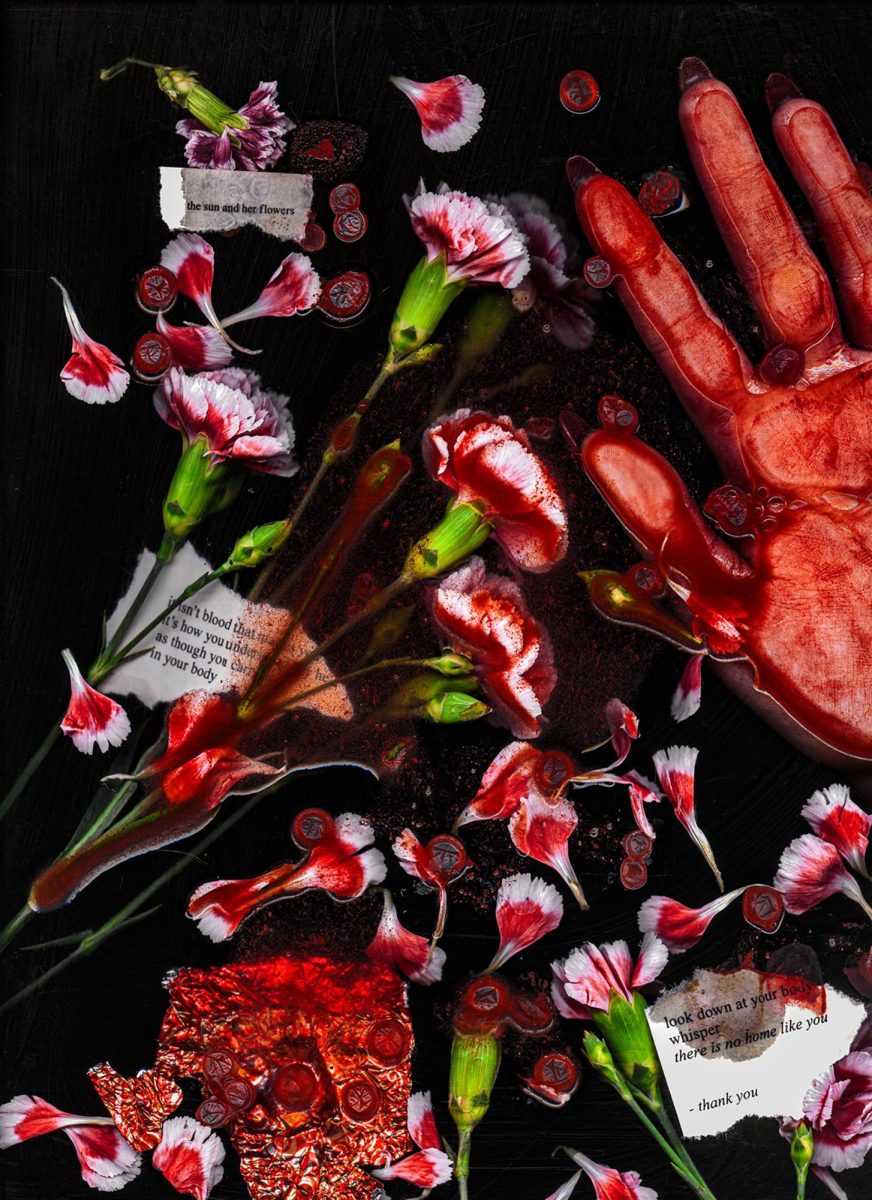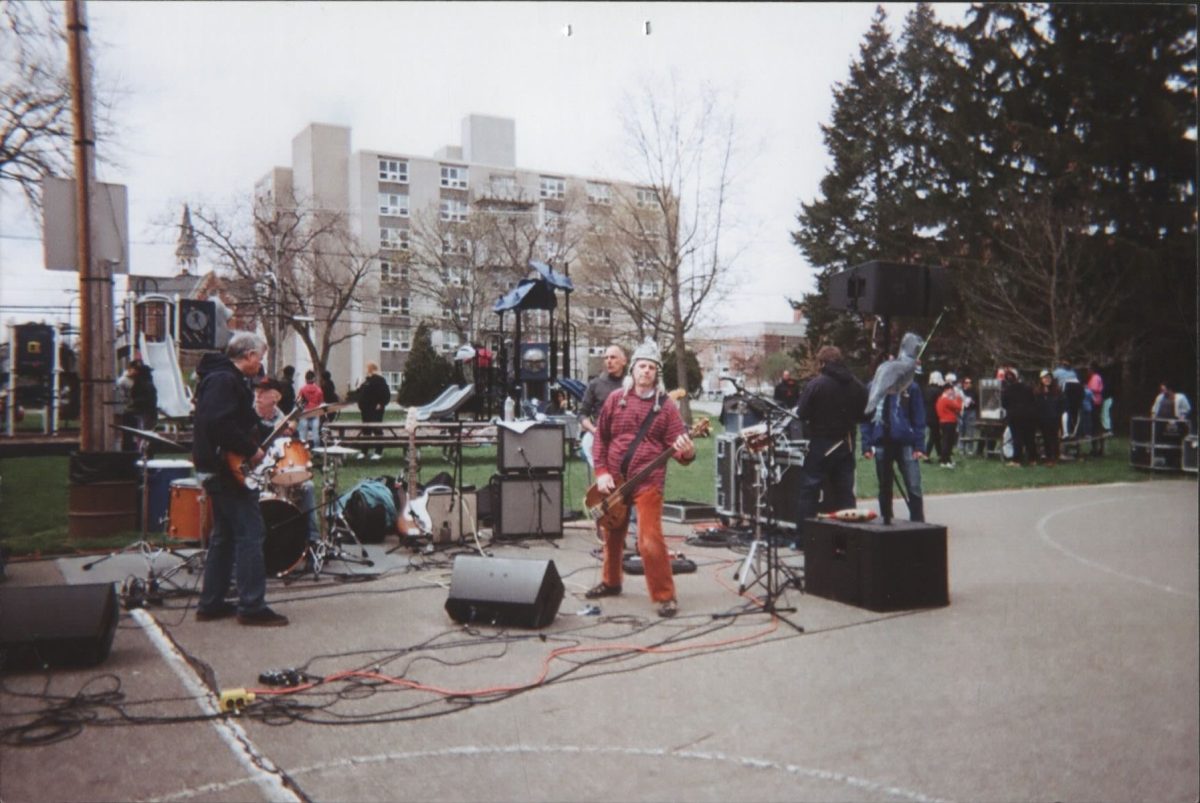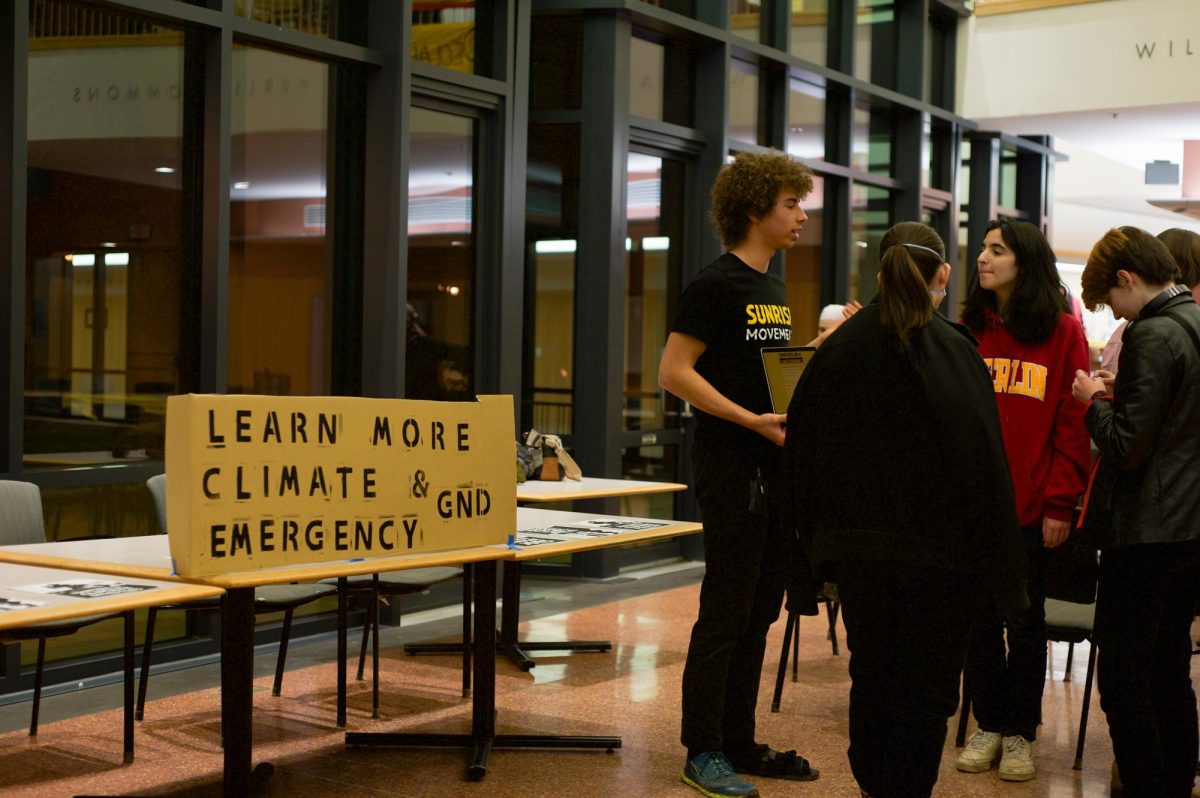The Oberlin Review has made the decision to change the name of what was formerly known as the This Week section to The Bulletin. This change will soon be reflected on our website. We hope that this decision will better reflect the goal of this section, which is to emphasize the importance of student voices and campus culture.
Oberlin, for many, signifies music and art as it intertwines with academia. It invites a unique collective of individuals into one space and creates a recognizable “Obie identity” that’s almost contradictory in its attributes of shared individualism.
The class of 2027 has been on campus for just over a week now, guided from orientation activities to Connect Cleveland, only to be thrown right into the first week of classes. For College first-year Mattias RowenBale, orientation — a blip in the entirety of his academic career — created a dynamic experience of constant activities and streams of socialization from 9 a.m. to late in the night.
RowenBale’s life is characterized by the arts. He brings his unique artistic experiences to this community: for around 540 days now, RowenBale has written a poem each day. He assembled the poems, written from last July to this July, into a collection representing his experience of being 17. His life isn’t just defined by poetry, though — there’s also circus arts.
When he visited for All Roads Lead to Oberlin, OCircus was immediately on his radar, as someone who loves to do aerials, juggle, and unicycle.
“One of the people who was showing me around practice [during All Roads] was like, ‘Oh, we actually need someone who unicycles,’” RowenBale said. “Coming here has been really fun because I do so many different things and I’m so involved in all sorts of activities and extracurriculars that I’m really hoping to continue to be involved in. [It was] wonderful in OCircus to just show up and on my first day teach three people how to unicycle.”
RowenBale’s sentiment of craving involvement is far from unusual, as every new Obie brings something distinct to the table that fills them with a sense of passion unlike any other. College first-year Mae Glickman has noticed an almost complete lack of what she phrased as “casual interest in hobbies.”
“People are really focused and really committed, whether it’s their side hobbies or what they’re studying, and I can’t quite describe it yet, but there’s something really cohesive about the way everyone works together,” Glickman said. “I think it’s an interesting experience coming to a place where everyone is super focused and passionate and interested, and feeling like, ‘Yes, I belong and these are the people I want to be around,’ and feeling slightly intimidated by how intense everyone is in a good way. … I like being a [first-year] and being small and vulnerable and new and stupid and making mistakes. The stakes are so low in the best way possible.”
Glickman shares RowenBale’s, and many other first-years’, intrinsic curiosity and even naivety that comes with arrival into a space so new and imbued with a beautiful and unique intensity.
“[I’m] looking forward to exploring areas of my interests or skills I’ve either put aside or haven’t explored yet,” Glickman said. “I was a dancer pretty seriously until I was 13, and I quit, but not totally. … I’m excited to get back into that here and do it for fun and to move my body and for that to influence other areas. I never learned how to ride a bike, so I’m excited to learn how to. … I just registered for sound painting, which I’ve never heard of before, and it’s kind of scary because I think I’ll be the most beginner in that class, but I still want to do it and push myself out of my comfort zone.”
Like Glickman, double-degree first-year Moss Seymour anticipates utilizing the vast array of resources that Oberlin has to offer, for it would be a waste not to. Seymour’s situation coming into Oberlin is particularly unique; they took a gap year
abroad after dropping out of a university in England.
Their year abroad consisted of painting school, two weeks as a construction worker, and an artist’s residency in Colombia. These experiences have caused Seymour to take greater consideration in their own life and find an illustration style particular to them. At Oberlin, they hope to create a graphic novel which would be illustrated and narrated by them, corresponding to an album they created — the perfect intersection of their interests as a TIMARA and Studio Art major.
“I’m just in a point of awe about how many things there are to create here and to use in the process of creation,” Seymour said. “Here, there’s a lot of people who are doing really cool shit all the time but you only find out after having talked to them [for] like the fourth time. … There’s just a lot of really humble people. A culture of kindness, as cheesy as that sounds, is really relevant here.”
RowenBale and Glickman both echoed this idea of a culture of kindness, noting a focus on self in artistic creation rather than competition, where discovering new ways to create is not only normal, but encouraged. For example, College first-year Lucy Burton discovered contact improv, a renowned staple of Oberlin, in this last week.
“It was the most mind-blowing [and mind-]boggling thing I’ve ever done and it was so good for my mental health,” Burton said. “I’d never done anything with dance ever, but it connected all the things that I like to do — I literally can’t function if I don’t move my body. … I love connecting with people and being present. … I wasn’t talking and I was still able to connect which was so interesting.”
Outside of the silence of contact improv, Burton has cherished the conversation she has had in this first week.
“I feel like I’ve found that a lot of people are similar to myself in that they are down to have a very intense conversation but also totally okay with goofing off,” Burton said. “Everyone is very present … everyone is like sitting in a circle and just being with each other … and that’s what I was really looking forward to in a college experience.”
With the semester now just starting, there are many more experiences to be had for the class of 2027. There are more artforms to explore and spaces for their artistic and individual identities to deepen.
“Everyone told me before I came here [that] it’s a bubble,” Seymour said. “But it’s a nice kind of bubble where, for this portion of time, we get to exist in a space where I feel like a lot of judgment doesn’t exist. … I haven’t been in the same place for a month straight for a year, and this for me, settling down in one place and looking around and being like, ‘Not only am I going to be here for probably five years, but I get the privilege to be in this space for five years.’”


